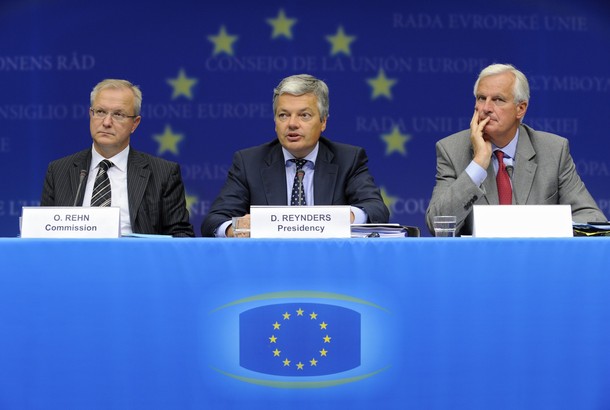
The EU’s finance ministers agreed this morning to submit the outlines of their budget plans for approval by the European Commission. The hope is that this will forestall another Greek-style bailout and the collapse of the euro.
Jan Strupczewski for Reuters ("Ministers agree to EU vetting future budget plans"):
The process, called the European Semester, is to start from 2011 and will involve governments in the 27-nation EU sending their expected budget revenue and expenditure numbers to the executive Commission by the end of April.
"This is a major improvement of our economic governance architecture," Economic and Monetary Affairs Commissioner Olli Rehn said in a statement welcoming the agreement. He said the decision would "help us to correct imbalances and prevent deviations in due time, when Member States prepare their national budgets and national reform programs."
The agreement is the most tangible result so far of work done by the ministers since May to toughen EU budget rules to ensure there is no new sovereign debt crisis like the one triggered by Greece.
The EU executive will check whether the budget plans submitted are in line with economic guidelines set by EU leaders, and with national long-term deficit-cutting plans and national reform programmes that often have to accompany fiscal consolidation. The Commission will then write an opinion and euro zone and EU finance ministers will later discuss the draft budget plans at a regular monthly meeting before the end of July. This would give the Commission and the ministers a chance to discuss the budget plans of an EU country that are inconsistent with its earlier declared fiscal consolidation or reform programmes.
They would also have a chance to look at budgets or reform programmes that will have a clear impact on other EU countries, but have not yet been voted into law by a national parliament. "The implementation of the European Semester will improve economic policy coordination in the EU and help strengthen fiscal discipline, macro-economic stability and growth," said draft minutes of the ministers meeting, obtained by Reuters.
WSJ‘s Matthew Dalton reports ("EU Ministers Back Tighter Budget Control") that "The council will give policy advice in June and July to individual member states, before national parliaments approve their budgets for the next year." This is an end-around concerns that having Brussels review budgets approved by national legislatures would violate state sovereignty. Instead, the broad parameters of proposed legislation would get initial sign-off by the EU before going up for a vote.
Alexei Monsarrat, director of the Atlantic Council’s Global Business and Economics Program, observes that, "The Greek (and wider) debt crisis demonstrated that the Euro experiment has to move to the next phase if the currency is to survive. The implicit guarantee to the Germans that Eurozone countries would remain fiscally responsible has to be made explicit. This deeper integration will likely happen slowly, and this measure is a good first step."
That strikes me as right. While it’s debatable whether the Euro — much less whether some of the EU’s weaker economies ought to have been included in the common currency — is a good idea, the bottom line is that those decisions were made and will be next to impossible to reverse. And a common currency without some modicum of centralized oversight to ensure that the various economies in the market don’t take actions that put everyone else’s stability at risk is madness.
And, frankly, it’s difficult to imagine that the Germans, in particular, would have agreed to keep propping up the system without something like this.
An FT editorial’s headline captures this with characteristic pith: "Europe inches towards prudence." The piece itself does a yeoman job explaining what this means — and perhaps more importantly — what it doesn’t mean.
The reform does not definitively demarcate national and European regulators’s powers, but in normal circumstances, there is no mystery. European bodies will set common standards while national bodies supervise individual institutions. Any “power grab by Brussels” (in fact, London, Paris and Frankfurt since the bodies will sit in those locations) is only a possibility in a crisis or if national regulators squabble or break European law. A national government cannot be forced to bail out a bank.
How good a solution this is depends on whether the European authorities do a good job. Harmonised decisions are, up to a point, inherently preferable to the self-undermining spectacle of national regulators dealing with common dangers in uncoordinated ways. Undoubtedly a common rule book will improve on practices in the laxest member states: it gives prudent nations a way to push prudence on careless neighbours.
The Eurozone won’t suddenly be transformed into a central economy in the manner of the United States. But they have taken a needed step toward fiscal sanity.
James Joyner is managing editor of the Atlantic Council. Photo credit: Getty Images.
Image: eu-ministers.jpg
